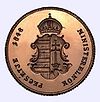- István Dobi
-
István Dobi 
3rd Prime Minister of the Second Hungarian Republic In office
10 December 1948 – 20 August 1949Preceded by Lajos Dinnyés Succeeded by Himself, as Chairman of the Council of Ministers Chairman of the Council of Ministers of the People's Republic of Hungary In office
20 August 1949 – 14 August 1952
(3 years, 248 days)Succeeded by Mátyás Rákosi 3rd Chairman of the Presidential Council of the People's Republic of Hungary In office
14 August 1952 – 14 April 1967Preceded by Sándor Rónai Succeeded by Pál Losonczi Personal details Born 31 December 1898
Szőny, Austria-HungaryDied 24 November 1968 (aged 69)
Budapest, HungaryNationality Hungarian Political party Independent Smallholders' Party,
Hungarian Socialist Workers' PartyIstván Dobi (31 December 1898 – 24 November 1968) was a Hungarian politician and prime minister of Hungary from 1948 to 1952.
Contents
Early life
Dobi originated from a poor peasant family and was born in Szőny, Hungary. He finished primary school and in 1916 came into contact with the peasant movement. He supported the Hungarian Soviet Republic and in 1919 he was imprisoned for the first time. Upon his release, he was active in peasant and social democratic politics from the early 1920s and under police surveillance for this. He later worked as a casual laborer and became a farmer by occupation. Although he was not a Communist, he was arrested several times during the regency of Miklós Horthy.
World War II
During the war he became one of the leaders of the Hungarian resistance until he was called up for duty, returning in the summer of 1945. By the end of World War II he had become a leading member of the Smallholders Party, which achieved a majority in general elections. Dobi was a member of the left-wing faction of that party, and advocated cooperation with the communists.
Post war
With the Smallholders being a part of Hungary's post war coalition government, Dobi was Minister of Agriculture. He held this post until he became Hungary's prime minister in December 1948.
In public relations terms, he was seen as someone supporting and shoring up the Communist's waning support, he lent some much needed legitimacy to the party, being from another party. In terms of allegations of collaboration with the party, the New Hungarian Encyclopedia says: "Following the ousting of the Smallholders Party right wing elements, he was selected to be president. Under his direction the party was cleansed of its reactionary elements and it became part of the program for building a people's democracy with the Communists."
Through taking on numerous high-profile roles, Dobi eventually became a high-ranking communist, although he only formally joined the party in 1959. He served as prime minister of Hungary from 10 December 1948 until 14 August 1952 and Chairman of the Presidential Council from 1952 until his retirement in April 1967. He was officially the second or third most powerful politician in Hungary, and supported the crushing of the Hungarian Revolution of 1956. He was a winner of the Lenin Peace Prize in 1962. He died in Budapest.
References
- Writings of István Dobi, Politikatörténeti és Szakszervezeti Levéltár, PIL 769. f.
- Hungarian Biographical Lexicon
- Biography In: Országgyűlési Almanach 1947–1949, Budapest, 2005, ISBN 963 03 3856 4
Political offices Preceded by
Béla KovácsMinister of Agriculture
1946Succeeded by
Károly BárányosPreceded by
Árpád SzabóMinister of Agriculture
1948Succeeded by
István CsalaPreceded by
Lajos DinnyésPrime Minister of Hungary
1948–1952Succeeded by
Mátyás RákosiPreceded by
Sándor RónaiChairman of the Hungarian Presidential Council
1952–1967Succeeded by
Pál LosoncziParty political offices Preceded by
Zoltán TildyChairman of the Independent Smallholders' Party
1947–1949Succeeded by
party dissolvedPrime Ministers of Hungary since 1848 Revolution of 1848 Kingdom of Hungary Transition period M. Károlyi · Berinkey · Garbai · Peidl (opposed by G. Károlyi · Pattantyús-Ábrahám) · Friedrich · HuszárRegency Transition period Communist Hungary Republic of Hungary Italics indicates interim holderHeads of state of Hungary since 1918 Hungarian Democratic Republic Hungarian Soviet Republic Provisional government Regency Fascism Transition to Communism Communist Hungary Republic of Hungary Revolution of 1848 Klauzál · BatthyányKingdom of Hungary Gorove · Szlávy · Zichy · Bartal · Simonyi · Trefort · Kemény · Széchenyi · Szapáry · A. Bethlen · Fejérváry · Festetics · I. Darányi · Tallián · György · Feilitzsch · I. Darányi · Serényi · Ghillány · Mezőssy · Wekerle · SerényiTransition period Buza · Csizmadia · Nyisztor · Hamburger · Vántus (opposed by Kintzig) · Takács · Győry · I. Szabó · RubinekRegency I. Szabó · Mayer · I. Szabó · I. Bethlen · Mayer · Ivády · Purgly · Kállay · K. Darányi · Marschall · Sztranyavszky · Teleki · Bánffy · JurcsekTransition period Communist Hungary Republic of Hungary F. J. Nagy · Gergátz · J. Szabó · Lakos · F. Nagy · Torgyán · Boros · Vonza · Németh · Gráf · FazekasMinisters of Agriculture, Industry and Trade (1848-1889)Categories:- 1898 births
- 1968 deaths
- People from Komárom
- Members of the Hungarian Socialist Workers' Party
- Prime Ministers of Hungary
- Agriculture ministers of Hungary
- Lenin Peace Prize recipients
- Independent Smallholders, Agrarian Workers and Civic Party politicians
Wikimedia Foundation. 2010.

